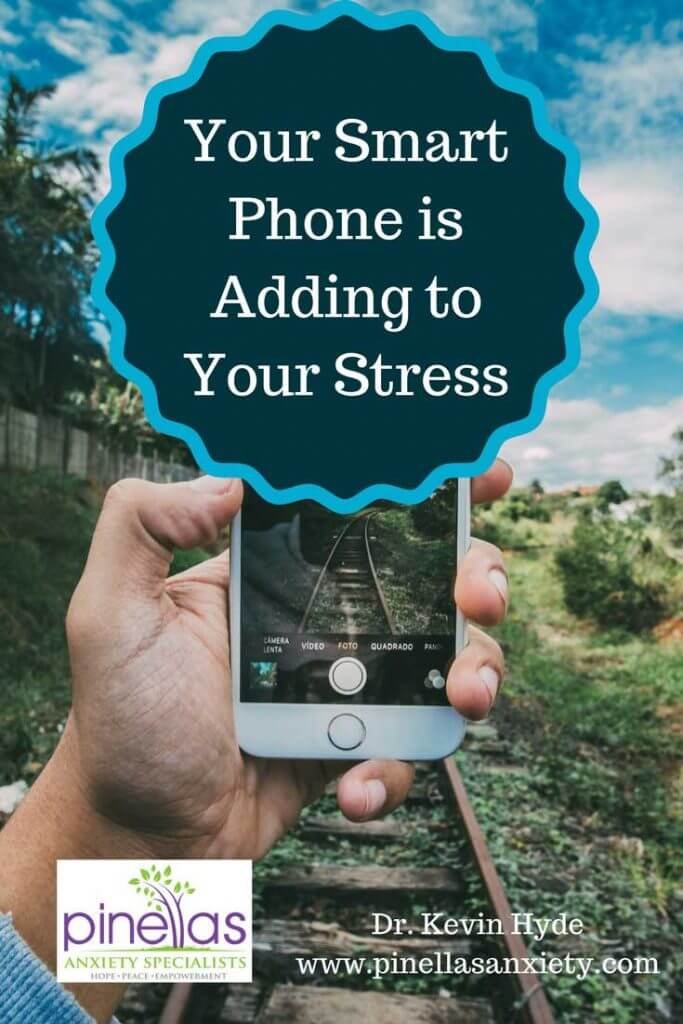Stress: How Smart Phones Are Ruining Your Life
It’s 3am. You’ve been lying in bed for 15 minutes after your overnight trip to the bathroom. It hits you. The urge to see what’s been posted to Facebook, Pinterest, Twitter, Instagram, or whatever social media platform you belong to.
It’s 3am. You’ve been lying in bed for 15 minutes after your overnight trip to the bathroom. It hits you. The urge to see what’s been posted to Facebook, Pinterest, Twitter, Instagram, or whatever social media platform you belong to.You can tell you’re not falling asleep right now, so what’s the harm in spending 10 minutes on the phone while you get tired? Suddenly it’s 4am and you woke your partner after laughing at a funny YouTube cat video. Oops.If you resemble this story, you aren’t alone by any stretch of the imagination. According to Statista, there are over 2 billion smart phone users across the globe and that includes 77 percent of Americans. According to eMarketer, the average user spends approximately 4 hours on their phone every day.Smart phones make it easier than ever to keep up with old high school friends, find a new recipe for dinner, or learn how to change your own oil. Unfortunately, the ability to have all the information in the world at our fingertips also comes with some drawbacks such as poor sleep, addiction, and even anxiety.
Smart Phones Impair your Sleep
As in the example above, who hasn’t checked their phone during an overnight awakening? This habit could be costing you valuable sleep time!Smartphones emit blue light. Blue light is the same type of light provided by the sun, which is interpreted by our brains as, “time to be awake doing things!” That’s not exactly the message you want to be sending your brain in the middle of the night.That’s why it’s recommended that you put down your smartphone an hour before you intend to fall asleep and do not check it in the middle of the night. Ideally, it’d be in another room, but we all know that isn’t happening.Try and maintain a consistent bedtime routine that involves calming activities and cut out devices that emit blue light in favor of books, magazines, kindle, music, etc.
Smart Phones Demand Your Attention
With the prevalence of dinner table phone-checking, some families and friend groups have resorted to making a game out of not touching their phones. The first person to reach for their phone picks up the entire check.This game could sound fun to you if you’re a bit older, or it could be torture for you if you’re a millennial. In any event, the purpose is to encourage conversation and remaining in the present moment with your dinner party.It’s not unusual for our family to all be in the same room together, with each person captivated by their individual device. While reading the latest updates around the world, we are missing out on life in the present moment.Aren't the family, friends, and others around us worth our focus?
Why Can’t We Put the Phone Down?
Every time we see a new notification, get an e-mail, or read the latest news, our brain emits a hit of dopamine. Dopamine is the feel-good chemical in the brain that we enjoy while doing something pleasurable.It’s also what drug addicts are searching for when they use more and more of their drug of choice. That's right, smartphones provide some of the same addictive properties as illicit drugs!Thankfully you don’t need to be out on the street at 3am to get your hit, but smartphone addiction can still negatively impact your life.
The Smart Phone Diet to reduce stress
Just like someone addicted to drugs or alcohol can find ways to cope and live a full life, you too can find ways to reduce the impact of smartphone addiction.But first, you may want to take a few minutes just to think about how your smartphone use is impacting your life.If you’re one of those who is struggling in relationships because one or both of you are always on the phone, or if you’re losing sleep because you need to know what’s going on in the world, then these tips can help free you of the burden from smartphone addiction.
Schedule screen-free timeHave one day a week be dedicated to present moment awareness. Keep the phone on the charger and enjoy a day with your family and friends, free of the smartphone distraction. Use this time to notice the beautiful little things in life, and to have meaningful conversations that deepen relationships.
Delete apps that hook youIf you know that Facebook is the app that always has you reaching for the phone, delete it. You can always re-download it, but that process will take a few minutes and you might decide it isn’t worth it right now. You might even choose to take a longer break from that app and see how it affects your life. A few times I’ve given up Twitter for lent, and somehow, I survived. You can too!
Make it difficult to access during times you need to focusWhen you have a task that needs your focus, it’s too tempting to have your phone in your pocket. Every interruption takes approximately 25 minutes to recover from when trying to re-focus. You can avoid this problem by having your phone someplace difficult to reach during your focus time.
Ask for helpHaving an accountability partner can be so helpful in breaking free. You may not even realize when you pick up the phone because it’s an ingrained habit, but your partner, kids, or friend can point it out to you. Your desire to change may even prompt your loved ones to try it as well!
Now that you’ve given yourself some space from that constant urge to reach for the phone, you can find positive ways to fill the extra hours in your day.Rewarding yourself by engaging in meaningful activities will be the best decision you ever made. Think about it, on your 80th birthday will you be reflecting on all those Facebook statuses you read, or the quality moments you had with your family?It’s never too late to begin to add more of those valuable memories you can cherish for a lifetime.If you've been struggling with addiction to your smart phone, or aren't sure why you're feeling so overwhelmed with stress, please reach out for a free consultation. I'd love to chat with you about what you can be doing to start taking control of your life again. I have a few spots available in my practice, so if we're a good fit, we can discuss what that would look like.
Address Physical Symptoms of Anxiety
I was featured recently in an article on how to address physical symptoms of anxiety. You can check out the full article in Bustle. Here's a snippet:
I was featured recently in an article on how to address physical symptoms of anxiety. You can check out the full article in Bustle. Here's a snippet:
“Deep breathing can be a very quick, and effective way to stop an anxious response before it accelerates. “During moments of anxiety, your brain’s fight-or-flight mechanism is activated,” Kevin Hyde, licensed psychologist tells Bustle.”
The article features many other techniques as well, including:
- Add self-care into your daily routine
- Take a pause to notice your thoughts
- Avoid caffeine, nicotine, and other substances that are intended to give you energy - they often fuel our anxiety response
- Engage in acts of kindness towards others, and yourself!
If you're interested in discussing how to work these strategies into your life to help address your stress, worry, and anxiety, please reach out for a free consultation. I'd love to chat with you so you can see what your life could look like when you start to take control again. I have a couple slots open in my practice if we decide we're a good fit.
This is Us - Lessons from William Hill
My wife and I are a little late to the game in discovering the NBC show This is Us (we rarely get to watch TV due to having a couple little ones), but we finally started watching. As with the rest of America, we’ve been captivated by the family dynamics, and the obvious affection the characters have for each other. In particular, I fell in love with William. The biological father that Randall finally just met at 36 years of age, and at a time when William is already in the end stages of cancer.
This article has spoilers from the show This is Us. If you don’t wish to know events from later in the series, please stop reading here.My wife and I are a little late to the game in discovering the NBC show This is Us (we rarely get to watch TV due to having a couple little ones), but we finally started watching.As with the rest of America, we’ve been captivated by the family dynamics, and the obvious affection the characters have for each other. In particular, I fell in love with William.The biological father that Randall finally just met at 36 years of age, and at a time when William is already in the end stages of cancer.The portrayal of William, a former drug addict who dropped his newborn baby off on the doorstep of a fire station, gives humanity to a person our society would often shun.We don’t give many drug addicts a second chance. Someone who gives up a baby can’t be trusted.An elderly person in the final stages of cancer is typically hidden away in a nursing home so we can avoid the discomfort of watching them die.I couldn’t help but learn a few lessons from his story, and the insights he provided into the process of dying.
Small Kindnesses Have Large Impacts
After William’s death, Randall is struck by the emotional reaction from people he’s known for years, but barely knew. The mailman dropped off a package and inquired about William, and Randall shared the news of William’s recent passing.Randall appears dumbfounded when the mail carrier broke into tears and told of William’s kindness in chatting with him each morning. How in those short times together, they struck up a friendship.It was clear how much he appreciated that William treated him as a human being, and was willing to spend time to learn about his family, while most people just view their mail carrier as the person who drops off the bills or latest Amazon order.It is truly amazing the impact we can have just by showing kindness to another human beings A smile, “hello,” or “how are you doing,” to a complete stranger can change the course of their day if they’ve been in a bad mood. Although I tend to be pretty shy, I try to use this example and be conscious of showing kindness to others when I’m out and about.And the cherry on top is that altruism has even been shown to improve your own mood as well. Help others to help yourself!
Appreciate The Little Things
My favorite scene in the series is in the Pilgrim Rick episode, when William was speaking with Olivia Maine on the front porch, and she asks, “how does it feel to be dying?” William replies,
“It feels... like all these beautiful pieces of life are flying around me and I’m trying to catch them. When my granddaughter falls asleep in my lap I try to catch the feeling of her breathing against me. When I make my son laugh I try to catch the sound of him laughing-how it rolls up from his chest... but the pieces are moving faster now and I can’t catch them all. I can feel them slipping through my fingertips. And soon where there used to be my granddaughter breathing and my son laughing, there will be nothing. I know it feels like you have all the time in the world, but you don’t, so stop playing it so cool. Catch the moments of your life, catch them while you’re young and quick, because sooner than you know it, you’ll be old and slow... and there’ll be no more of them to catch.”
I mean, how beautiful is that?I’ve found that as we age, life tends to sweep us into the moving river of paying bills, keeping the yard tidy, doing chores, working, trying to keep the little ones happy etc., and we can forget to pay attention to where we are or what we’re doing.We're so busy with the day-to-day minutia, we even stop contemplating the meaning of life or envisioning how to live out our dreams. I know my 17-year-old self wishes I had more time to plan adventures and check items off the bucket list these days.So often we’re ruminating on things that happened to us or worrying about what’s coming next that we are never living in the present.We don’t even recognize that there are beautiful pieces flying around us every day, let alone contemplating how to catch them.Learning how to be mindful during the most mundane tasks can open our awareness to the beauty of life. Mindfulness helps us to stop living in the past or future and begin to spend time in the present moment.So slow things down today and try to notice one or two of the beautiful pieces in your life. You’d be surprised by how far gratitude can take you.
Relationships Are More Important Than Things
The final lesson from William is that you can live a fulfilling life without keeping up with the Joneses. William was blessed with the ability and the desire to form deep relationships with the people in his life.From the mailman, to the son he only met at the end of his life, to the addict he befriended by pretending to enjoy football, he valued the human connection that arises from intimacy and vulnerability.William did not shy away from his troubled past.He shared that information because he understood that those experiences are just part of who he is as a person, and that by opening up about his own failures, others would be more likely to be willing to trust and share their own challenges.He allowed others the opportunity to be vulnerable without being judged, because he knew from personal experience how that is the key to a life well-lived.Nobody on their death bed asks to see a picture of their Mercedes or to look over their resume. They ask for the people that mattered to them throughout their life.
They regret not having time for their spouse, kids, or friends.
Take a moment to consider the people you value and how you can show them they matter. Schedule time to deepen those relationships and create lasting memories that will mean so much more to you (and them) than a bigger boat.If you’ve read this far, I hope you’ve gained a little appreciation for the lessons taught by William Hill. We can all stand to use him as an example of overcoming challenges and finding happiness and peace in the end.If you’ve struggled to overcome obstacles and would like a little extra help, please reach out for a free consultation. I have a few open slots in my practice and I’d love to discuss how we could work together to help you reach your goals.
How Do I Not Burden My Family?
Millions of people are coping with mental health issues at this very moment. It could be anxiety, depression, ADHD, or chronic stress. It’s pretty common to walk through life shouldering these burdens by ourselves.
Nobody wants to burden family, friends, or acquaintances with their problems.
Unfortunately, this means that the majority of people with mental health concerns end up not receiving appropriate treatment or support. Only one-third of those with a diagnosable anxiety disorder reach out for help!
Millions of people are coping with mental health issues at this very moment. It could be anxiety, depression, ADHD, or chronic stress. It’s pretty common to walk through life shouldering these burdens by ourselves.Nobody wants to burden family, friends, or acquaintances with their problems. Moms especially tend to shoulder this burden themselves.Unfortunately, this means that the majority of people with mental health concerns end up not receiving appropriate treatment or support. Only one-third of those with a diagnosable anxiety disorder reach out for help!Would you not visit the emergency room for a broken ankle because it would be a burden? Would you not visit the dentist for a tooth infection because it would be a burden? Would you not visit the doctor for a new, discolored mole on your skin because you’re just too busy?Sadly, we often take our physical health concerns more seriously than our mental health struggles, when both are important, and both can be debilitating.
Why don’t we share?
We fear that nobody will understand what we’re going through.We fear that someone will tell us we don’t have it that bad or to just suck it up.We fear we are going to bring everyone else down with us if we open up about just how messed up we feel inside.The common theme among those fears is that we assume we know what others will think, feel, or do when we tell them our struggles. That’s called mind-reading. I don’t know about you, but I’ve learned I am no Miss Cleo, so my efforts at mind-reading are laughable.These statements are stories your mind tells you because of your anxiety or depression. To take those stories at face value is like believing everything a used car salesman is telling you! You’ll want some evidence to verify them before handing over your bank account.Now take a second and think about the last time a friend or family member reached out to you and truly asked for your help. They showed vulnerability and said it’s too much for me right now, I want to share this with you. How did you react? What did it feel like to help?Most of my patients tell me they feel honored that someone has trusted them enough to share a difficulty. They say that it felt good to be able to help someone they cared about, even if it was just by listening and empathizing with their experience.It felt good!So that means that by NOT sharing your challenges with someone you trust, you are DENYING THEM THE OPPORTUNITY TO FEEL GOOD!The burden on our loved ones actually comes from them seeing us struggle and not having any idea why. Opening up about what you are feeling helps them to understand why you’ve been exhausted, staying in bed more often, snapping more easily, or forgetting details.Beginning to share your story will no more burden your family, than lifting a 10-pound weight for 12 reps will make you a muscle-bound freak. To build muscle takes time and effort, and that’s what it takes to burden our loved ones as well.
Why to share your story
There are so many reasons to share your struggles, not the least of which is that the simple act of telling someone what’s been running through your head takes away some of the power those thoughts have.So many people tell me they were anxious or even terrified to speak of their mental health issues, but it was an immediate relief to have it out in the open. Holding those thoughts and feelings in takes a toll on you physically and emotionally.You’d likely be surprised how often the response is, “I’ve been through that too.” None of us walk around with signs over our head that say “anxiety” or “depression” or “ADHD,” so we end up feeling alone in our struggles. Not realizing our neighbor, best friend, or co-worker has dealt with something similar in the past.While just feeling heard and understood can help, it’s also possible that someone might actually be able to help! Whether it’s problem solving, providing information on a helpful resource, or giving the name of a good therapist, having another set of eyes on our problems can give us options we never would’ve considered on our own.When either my wife or I have gone through particularly stressful times, the other is more than happy to take on extra responsibilities around the house or with the kids. Having one fewer thing to worry about can mean more than you realize.
How to open up
You aren’t going to tell your mail carrier about your worries that you’re a bad mother. However, when you really think about all the people you know, I’m guessing you can think of one or two that would be trustworthy and caring with your information.For many of us, this begins with our romantic partner. While you worry about burdening them, remember that they will likely feel relieved to finally understand what’s been on your mind. Chances are they’ve noticed you struggling.Be willing to directly state what you need.Men especially tend to jump into problem solving mode, when you might just need them to listen and understand. Let them know ahead of time what you most need in that moment. And it can change from moment to moment!This open communication on how to help is important so that you don’t feel invalidated by their response.
Mindset
The final piece I want to leave you with is that you are important!When you’re on an airplane, they tell you to put your own oxygen mask on first before helping others. If you pass out because you tried to put someone else’s mask on before your own, you wouldn’t be much help!The same thing goes for the rest of life as well. As much as we put others before ourselves, especially our children, it only works as long as we are fully functioning. Once we’re struggling to keep our own heads above water, it becomes a bigger stressor to try and keep others afloat as well.By keeping your struggles to yourself, you are not able to be as helpful to people as you'd like! When you share with others, you are allowing yourself to be important, and asking that others at least acknowledge what you are going through.Regardless of whether you decide to share those internal struggles, please remember to prioritize your own physical and mental health! At the very least, it allows you to better help those you care about most, and can reduce the weight of the stress, anxiety, worry, or depression you're carrying. Schedule self-care activities each week so you don’t fall prey to neglecting yourself.Do you miss coffee with a girlfriend? Trivia night with the boys? Maybe it’s a warm bath. It could be exercise or meditation. What you do for self-care is up to you. As Nike says, just do it. It’s important.If you’ve been struggling for awhile and feel like it wouldn’t be enough to share with just family or friends, please reach out for a free consultation. I’d love to help you see that there is hope. You deserve to feel joy again.
How to Stop Those Pesky Negative Thoughts
You had a good day. Got the kids to bed without too much fuss and they didn’t kill each other. Enjoyed dinner with the family and it felt like things were going well.
Then it happens. Out of nowhere, the little dark angel in your head reminds you of how yesterday wasn’t so hot. In fact, it says that yesterday you were a failure as a parent.
It starts off quiet, but before you know it, all you can think about is the many mistakes you’ve made. You focus on how everybody else is a better parent than you. You know your kids are going to be messed up as adults because of your screw ups!!
You had a good day. Got the kids to bed without too much fuss and they didn’t kill each other. Enjoyed dinner with the family and it felt like things were going well.Then it happens. Out of nowhere, the little dark angel in your head reminds you of how yesterday wasn’t so hot. In fact, it says that yesterday you were a failure as a mother.It starts off quiet, but before you know it, all you can think about is the many mistakes you’ve made. You focus on how everybody else is a better parent than you.You know your kids are going to be messed up as adults because of your screw ups!!You try to ignore it and think about something else. You tell it to leave you alone. It seems to come back stronger every time.It just won’t stop.If that story resonates with you, then I hope you’ll find this article useful in helping you to take some of the power away from that dark voice in your head. Because even though we can’t always get rid of it, we can find ways to live a good life in spite of it. Your emotions do not need to be controlled by those negative voices.I want to help you learn to DEFUSE from those negative thoughts.
What in the heck does it mean to defuse?
When you think something and you believe it 100% such that it controls your emotions and your behavior, we can say you are fused with that thought. This is our natural tendency since we generally believe our thoughts. I mean, why wouldn’t we trust our own head when it’s been with us our entire lives?What if I told you that your mind lies to you…It’s true. You can think things that are not true. Try it for yourself. Picture yourself doing 10 pushups right now while you’re sitting here reading this blog. Can you feel the burn?See, you can THINK something that is not actually reality. In fact, your mind does this to you dozens of times every day and you just aren’t AWARE of it!Let me say that again. Your mind is constantly coming up with stories about who you are that are not inherently true. You just don’t question it because you are so used to fusing with those stories!
Can I stop fusing with these negative thoughts?
Yes you can!But first, you need to become aware that it is happening. Building the skill of mindful awareness will help you recognize your thoughts as thoughts.Pause for a second and notice what’s going through your head for the next 15 seconds.Did your mind drift? Did it think of anything emotionally charged? Did it stay focused on the present experience, or go into planning mode? What was your mind doing while you paused?When you’re not used to doing this it can be a) difficult and b) a little scary. It takes practice to notice our thoughts.You might want to start by using emotion as a cue. When you begin to feel a strong emotion, take a pause and notice what your mind is saying.It might give you pictures, or phrases, or maybe even sound like your mother. Just begin to notice how your mind speaks to you, and causes an emotional response. That is fusion in action.Check out my post on mindfulness meditation if you want to learn more about developing this very useful skill.
What to do once you’ve noticed the thought
Okay, so you’ve taken your pause and recognize your mind just told you a story. Now, recognize what a thought actually is. (Technically, it’s a bunch of cells in your brain having an electrical and chemical response to a stimulus, but you can ignore that.) For our purposes, a thought is… A THOUGHT. Duh.A thought is a thought. It’s not real. You can’t touch a thought. It can’t make you do something. It’s just a thought.Just as you thought about doing 10 pushups earlier and didn’t get any stronger, you can have this thought and not do anything about it.Usually, you have a thought, believe it, it affects your emotions, and it affects your behavior. For example, maybe you thought, “I’m a bad wife and mother,” so you felt sad/depressed, and because you felt that way you curled up in bed rather than talking to your spouse about the day. That pattern can play out a million different ways, but it typically results in trying to avoid the negative thought, trying to avoid the negative emotion, and behaviors that only make the thoughts and emotions more powerful.Defusion can help disrupt that pattern!Noticing that you’re having a thought, and recognizing that the thought is a thought which has no inherent power to make you do anything helps separate you from just believing the thought. Here is a short video that illustrates this concept.
Other tools to help defuse from negative thoughts
So I just told you that a thought is a thought and blew your mind. Now I’m going to tell you that a word is just a word and rock your whole world!We give meaning to words because that’s how language works. But a word is just a collection of letters and sounds, and has no meaning by itself. Don’t believe me? Go to China and ask for a watermelon. They won’t understand, right?Watermelon only has meaning in English because we’ve learned over the course of our lives that it’s a green fruit with pink flesh that is refreshing on a hot Florida day. Without that learning and context, watermelon is just a collection of letters and sounds.Now that you know this, you can take advantage of it by taking those negative thoughts you’re fused to and turning them back into meaningless collections of letters and sounds.Do that by singing it in a song! Use the tune of the happy birthday song (don't worry, it’s not copyrighted anymore so you won’t need to pay any royalties) and repeat your mind’s story.I’m a loooooser, I’m a looooser, I’m a loooooooooser, I’m a loooooooser.It is really hard to take our mind seriously when it’s singing a silly song! You can even have Mickey Mouse sing the song! With that funny voice, it gives the thought even less credibility.Or even without a character or a song, just say the thought over and over and over and over. When you say something repeatedly, it begins to lose any meaning associated with it.Try it yourself: Say bowl one time. I’m guessing you also pictured something that matches your notion of a bowl. Now say bowl repeatedly for the next 30 seconds. Were you still picturing your ideal bowl at the end of the exercise?A word is just a collection of letters and sounds and only has meaning because we have learned that it has meaning. Repeat your thought over and over and over and it turns back into a collection of letters and sounds removed from the meaning.
One last tip to help defuse from negative thoughts
Say you’ve tried the techniques I just discussed, and the thought is still knocking around your head. The final tip here is simply to acknowledge that the thought exists, “thank you, mind,” and continue doing what is important and meaningful to you.It can be helpful to imagine that you’re a bus driver and your thoughts are passengers. Some are courteous, and others throw spitballs at your head. You know none of the passengers can actually physically hurt you because they are just thoughts. Your job is to continue driving the bus towards your values… those things that you find important and meaningful. If the rowdy passengers are throwing paper airplanes and shouting in your ear, you simply say, “thank you, you can return to your seat now,” while continuing to keep the bus on track.This committed action to doing the things you find meaningful makes it harder for those negative thoughts to continue to control you. You are taking control by choosing to do things rather than simply avoid the thoughts and emotions. That is so powerful.I know this concept can be a bit confusing, so I encourage you to reach out if you have any questions or need clarification (kevin@hydepsychology.com, 727-498-1809). And if you're ready to get to work in taking back control of your life, please schedule a free 30 minute consultation today.
Why is Parenting So Hard?
There is no denying it. Parenting. Is. Hard. My wife and I have split working and caregiving duties at various times, so we both gained a healthy respect for the challenges and blessings of both sides.
Working is difficult because you miss the kids, but you often get socialization and adult conversations throughout the day. Staying home is rewarding for the closeness that develops between parent and child, but there is very little rest and you start to wonder whether your conversational ability is going to be stuck at a 3 year old level forever. It’s so difficult to get that perfect balance of family, work, social, and personal life that lead to feeling fulfilled and happy.
But people have been raising kids successfully for thousands of years, why is it so hard for me?
There is no denying it. Parenting. Is. Hard.My wife and I have split working and caregiving duties at various times, so we both gained a healthy respect for the challenges and blessings of both sides.Working is difficult because you miss the kids, but you often get socialization and adult conversations throughout the day.Staying home is rewarding for the closeness that develops between parent and child, but there is very little rest and you start to wonder whether your conversational ability is going to be stuck at a 3 year old level forever.It’s so difficult to get that perfect balance of family, work, social, and personal life that lead to feeling fulfilled and happy.But people have been raising kids successfully for thousands of years, why is it so hard for me?
Social comparisons
I’m not saying parenting was easier for earlier generations, but they had different challenges than we have today.For one, our parents and grandparents weren’t able to compare their parenting experience with as many other people.There was no Facebook, or Instagram to make them wonder why everybody else is going to Disney World while they backyard camped to save money.With social media you begin to compare your daily life with everybody else’s highlight reel!I’m guessing you don’t post every struggle with your child, but focus on posting the fun, happy, extreme events that will make others jealous.Yeah? So remember that when you see a former high school classmate posting her amazing Pinterest creation while your ladybug cake looks more like a deformed cockroach.You don’t post your failures, and neither do your friends.This is an area where a good parenting group can be so helpful.I say “good” because it needs to be a safe place where people share their failures and help each other to recognize that we all struggle, and well have failures, and we all have some really cute moments as well.A group where everybody puts on their happy face and denies any challenges and talks about how their kids are all perfect little angels… GET THE HECK OUT OF THERE, IMMEDIATELY! That is The Stepford Wives and not real life!Churches, Meetup.com, PTAs, and the YMCA are some resources to look into for finding a good parenting group near you.
Keeping to yourself
This goes hand in hand with my recommendation for finding a parenting group.There are times when I’m watching the girls that I feel like a complete failure.I wonder why there wasn’t a test required before becoming a parent… and then I’m thankful there wasn’t because I might have failed!It’s impossible to be good at everything, which means we’re all going to screw up eventually.We’re going to have days we don’t want to get out of bed, or that we snap at our kids for no apparent reason.When we keep these feelings to ourselves, we can continue to live in a world where outwardly we are perfect and content, while inwardly we are fighting to stay afloat.We end up stuck on a lonely island where we can never get validation from others that these feelings are normal.Having someone you can open up to and share your thoughts with, who won’t just try to solve your problems or dismiss your concerns, is crucial. It can be your mother, your best friend, a therapist, or even a stranger on the internet (e.g., www.reddit.com/r/parenting, www.reddit.com/anxiety ).Opening up and sharing the burden lightens the load on our shoulders and helps us to feel normal again.I assure you, if you’re thinking or feeling something, there is a 99% likelihood someone else has felt the same way.It doesn’t seem like much, but just hearing “I’ve been there” can lift a huge weight off your shoulders.Even when it seems like there is no solution to your challenges, think about finding someone to share with.
What do we do about our parenting struggles?
There is no one size fits all solution to the challenges of raising a successful, happy family.Nor can we wave a magic wand and make your stress, worry, or anxiety disappear overnight.I wish I could, truly I do. There are small changes you can make today to start moving in the direction of feeling joy again though!
Cut back on social media - Facebook, Pinterest, Instagram, etc. can all be great resources for keeping in touch with old friends, or finding activities and recipes. They can also suck the life right out of you if you’re not careful! Figure out how much time you really want to spend on these sites, and think about blocking any people who are adding negativity to your life.
Adjust your expectations - Remember that while people aren’t posting their failures on your social media feeds, they are screwing up just as often as you. Let yourself be okay with screwing up now and then. The problem isn’t usually with the mistake, it’s how the mistake grabs onto your focus and leads to stress, worry, anxiety, and depression.
Use a gratitude journal - Writing down 3 things you are thankful for each day helps you to remember that the day wasn’t all bad. Find very specific things you have to be grateful for and it lessens the impact of those mistakes you’ve made. Over time, this can make it easier for you to recognize the good things as you go about your day!
Identify and use your support system - I can’t emphasize the importance of this enough. Make a list of the people in your life and start reconnecting with those who you miss, or that you would like to spend more time with. If you don’t feel your list of family, friends, or acquaintances will care about your struggles, a) you don’t know unless you’ve tried already, and b) it’s okay to find new sources of support. Use the resources I mentioned earlier to get connected with other parents to hear their struggles and you can share yours once you feel comfortable.
If you feel like you've tried these suggestions and more and it still wasn't enough, please consider reaching out for a free strategy call. We can discuss your specific situation, and help make a plan for getting you to your goals. I currently have a few slots available for new clients if we click and choose to go that route. As always, I'd love to hear from you, so please reach out if you have any questions to kevin@hydepsychology.com or 727-498-1809.
5 Tips for Getting a Good Night's Sleep
Sleep is probably the most underappreciated aspect of health. The doc always tells us to eat less junk and more vegetables, and to move our bodies 150 minutes each week. We’re told that eating better and exercising improve our physical and mental health, which is true. So you work for one third of the day, and one third of the day you try and do healthy things like exercise, but what about that final third of the day. When we’re busy with deadlines, or our schedules are jam packed because of our kids’ sports, sleep is often the first thing we sacrifice. “I’ll make up for it when I’m dead,” is the common joke. Sadly, the joke has some truth to it since poor sleep can double your risk of death.
Improve Your Sleep To Improve Your Life!
Sleep is probably the most underappreciated aspect of health. The doc always tells us to eat less junk and more vegetables, and to move our bodies 150 minutes each week. We’re told that eating better and exercising improve our physical and mental health, which is true. So you work for one third of the day, and one third of the day you try and do healthy things like exercise, but what about that final third of the day. When we’re busy with deadlines, or our schedules are jam packed because of our kids’ sports, sleep is often the first thing we sacrifice. “I’ll make up for it when I’m dead,” is the common joke. Sadly, the joke has some truth to it since poor sleep can double your risk of death.Of course we always hear stories of Bill Clinton, Tim Cook, and others who notoriously only need 4-6 hours a night to recharge and still accomplish big things. We almost see it as a badge of honor, arguing with our friends and coworkers about who got less sleep the night before. If you sleep 4 hours and feel rested and are able to accomplish your scheduled tasks without biting your loved ones’ heads off, then you can stop reading right here because you are one of the lucky few! For the rest of us, averaging 7 to 9 hours of sleep each night is incredibly helpful in improving our physical and mental well-being. Approximately 30 percent of the population deals with insomnia. That is over 100,000,000 Americans who are regularly not hitting their target amount of sleep! Poor sleep can lead to increased likelihood of obesity, traffic accidents, as well as reduced work productivity.Here are some tips to help you make the most of the sleeping hours so you can enjoy your waking hours.
Sleep hygiene
Just like personal hygiene involves washing your body, brushing your teeth, clipping nails etc., sleep hygiene is how we describe a group of behaviors that promote healthy sleep.
Naps - Try to eliminate or minimize any naps to ensure you are tired at bedtime. If you must nap, limit it to under 30 minutes.
Caffeine - Limit your caffeine intake to earlier in the day. For me personally, I avoid any caffeine after noon, but for most people they say no caffeinated drinks after 2pm. You may also want limit your water intake before bed to reduce nighttime wakings due to a full bladder.
Bed Activities - Only use your bed for sleep and sex. That means no eating in bed, watching television, or surfing social media for hours. We want your body to build a strong connection that being in bed means it’s time for sleep. Adding in other stimulating activities can disrupt that connection.
Electronics - Electronic devices such as televisions, smart phones, and tablets emit blue light, which sensors in the back of our eyes interpret as “the sun’s up, time to be awake!” For about an hour prior to bedtime try to limit your exposure to electronics. Alternatively, invest in blue light glasses that filter out the wakeful light.
Bedtime routine - As much as possible, have a consistent bedtime and routine leading up to bedtime. Try to engage in relaxing activities in the hour before bedtime and have a regular schedule (e.g., shower, brush teeth, read, sleep). This helps your body recognize that you’re getting ready for sleep.
Get Comfortable
Most people sleep a little better when the room is on the cool side, but this is personal preference. Try out a few different temperatures and coverings to see which allows you to feel the most comfortable. Also contributing to your nighttime comfort is your bed and sheets. It can be tempting to scrimp on your mattress, but do you really want to go cheap on something where you spend one third of your life? Having a mattress that is the right amount of firm or soft and supports you adequately is crucial for ensuring quality sleep and minimizing pain in your back or neck in the morning. If you find your sheets scratchy, you probably aren’t going to sleep with them rubbing against you for 8 hours. Find bedding that makes it easier for you to reach the right temperature without irritating your skin. It’s also important to ensure the room is free from lights and noises that can disrupt your sleep. Having a fan or white noise machine can help reduce the impact of external noises.
Racing thoughts
The most common sleep issue people talk to me about is that their thoughts seem to race at bedtime. I don’t know what it is about our beds that lead to this, but it’s extremely common. Thankfully, this is often addressed with a couple different strategies that are easy to implement. The first is to have paper and pen next to your bed that you can write down the thoughts that are bothering you. Many people report that doing so almost feels like it pulls the thought from their head and puts it down on paper and reduces their sleep problems. It’s almost as if your mind knows it doesn’t need to focus on the thought because it’s on the paper so you can remember it in the morning. Similarly, new research has shown that writing out a To Do list for the next day makes it significantly easier to fall asleep. On the paper next to your bed, think about what you plan to do the next day and write it out. This again frees up your mind from trying to ensure you don’t forget an important task, and can help you fall asleep an average of 9 minutes sooner than not doing so!!
Relaxation techniques
Some people find it helpful to do deep breathing techniques, or a mindfulness meditation practice before going to sleep. These can put your body in a state of relaxation, which allows for easier sleep. Deep breathing takes less than a minute, so with a little practice you can be on your way to easier sleep. Although mindfulness meditation is not intended to promote relaxation, most people do find that it’s helpful in that regard. Bringing yourself into the present moment for 5 or 10 minutes before trying to fall asleep can also help to calm intrusive thoughts. Free apps such as Calm and Headspace provided guided meditations that make it easy for beginners and experienced meditators alike.
Kids
Kids are my downfall. When Mary wakes me up after 3am I just cannot fall back asleep. We do everything we can to reduce her nighttime wakings… for the selfish reason of reducing my own nighttime wakings! If you have an infant, you're in for some sleep deprivation until they get into a routine that allows for sleeping through the night. If you have toddlers, there are some things you can try to reduce some of those nighttime intrusions.
Do not have them in the bedroom or bed with you after the pediatrician recommended period (typically one year, but speak to your child's doctor).
Ask yourselves these questions to try and understand the underlying issue: Is there a pattern? Is the child uncomfortable (e.g., hot or cold)? Are they having nightmares? Are they just looking for attention?
I’ll write an entire blog post about addressing the most common childhood sleep issues, but for now just do the best you can to proactively help your child address the issues you recognize.
Getting Yourself Back on Track
What do you do if you’ve had insomnia or sleep problems for awhile and need help getting back on track? You can use the techniques I mentioned above, and if that isn’t enough, I’d recommend speaking with your primary care provider or scheduling with a therapist who has experience working with sleep disorders. The American Academy of Family Physicians recommends Cognitive Behavior Therapy as the first line treatment over medication. Sleep medication is difficult to transition away from as the body often forms a dependence on it after a period of time. Cognitive behavioral therapy for insomnia is a treatment specifically designed to help those struggling with chronic insomnia. With the guidance of a therapist, you work to address negative thoughts and behavioral patterns that are interfering with effective sleep. Although returning to a healthy, natural sleep pattern requires dedication, it pays off in terms of quality of life and life expectancy. I have never met a patient who regretted their decision to put in the effort to improve their sleep.If you're ready to take back your life and improve your sleep, or overcome stress and anxiety, please reach out and schedule a free consultation. If you have any questions, feel free to shoot me an e-mail at kevin@hydepsychology.com, or to give me a call at 727-498-1809.
Tips to Beat Anxiety and Stress
In this blog, I’ll discuss a few methods to help cope with anxiety symptoms that can’t quite fit into their own separate blog. I’ve already discussed how to use deep breathing, progressive muscle relaxation, visualization, mindfulness meditation, and changing your perspective to help reduce anxiety or stress, but those aren’t the only tools available. Some other ideas that can be used together or in conjunction with a previously discussed strategy are: exercise, gratitude journal, social connection, and valued living. As I’m writing this, I realize some of these may actual turn into their own blog posts later, but enjoy the introduction for now!
In this blog, I’ll discuss a few methods to help cope with anxiety symptoms that may get their own blog a little later, but can be helpful for you right now. I've already discussed how to use deep breathing, progressive muscle relaxation, visualization, mindfulness meditation, and changing your perspective to help reduce anxiety or stress, but those aren’t the only tools available. Some other ideas that can be used together or in conjunction with a previously discussed strategy are: exercise, gratitude journal, social connection, and valued living. Moms especially can feel overwhelmed with stress and anxiety when juggling so many tasks. You can pick and choose what fits best with your personality and schedule, use what works for you, and forget about what doesn't!
Exercise
This is one of those things that our doctors tell us all the time. We all know that we should be exercising more, but it ends up being difficult to either start or maintain the habit. When we do though, it ends up being beneficial in a huge way both physically and mentally. Of course our medical doctors are typically referring to the health benefits such as lowered blood pressure, lowered cholesterol, and overall improved heart health, but we also know that exercise releases “feel good” chemicals in the brain. When we increase the levels of these chemicals, it makes it easier for us to view stressors as temporary, or to recognize that we do have the resources to overcome the obstacle we are facing. And the good news is you don’t need to run a marathon for these benefits. Even just adding in 15-20 minutes of walking to your daily routine can reduce your perceived stress, especially if you use the walking time for some mindfulness (that’s one of my favorite techniques). Walking around the neighborhood I just notice whatever I can. I don’t use the time to think of my grocery list, or what my kids are doing, but rather I focus on noticing the flowers, bushes, trees, cracks in the pavement etc.
Some tips to make it easier to add exercise into your day:
Set yourself up for success - have whatever you need prepared beforehand. Have the clothes you will wear laid out. Fill your water bottle then night before. The more steps you can prepare ahead of time, the fewer opportunities you'll have to say "no."
Schedule it - actually put it into your calendar with a notification. Scheduling time to take care of your physical and mental health is just as important as making time for family and friends.
Don’t rely on feeling motivated - even if you don’t feel like it, get moving.
Start small - if you don’t feel motivated, it’s disheartening to think of a long exercise session. Instead, tell yourself you’ll just go for 5 minutes and you can re-evaluate then. More often than not, once I’m started I can keep myself going.
Don’t expect perfection - there are times I do stop at 5 minutes. That’s OK! Tomorrow is a new day and as long as you continue to follow your schedule, it won’t set you back to miss a day here or there.
Share(AFTER you’ve completed your workout) - it can be motivating to share your achievements. However, it’s better not to tell people your plan beforehand, because our brain tricks us by feeling good when people praise us for the plan. Oddly, we're then less likely to actually start exercising because we already feel good! So share after you’ve accomplished something you are proud of, and only share with those who you know will give positive feedback.
Gratitude Journal
Even in the midst of unbelievable trials, we all have things that we can be grateful for. When we’re feeling overwhelmed, it’s easy to miss or forget those things and to focus on the pain instead. Just taking 5 minutes to write down (yes writing it is important) 3 things you were grateful for today can help to start changing your mindset. At first it can be really hard. You’re helping your brain remember how to notice the positive things. Keep at it and it will get easier, and you’ll have a notebook of good things to look at when you’re feeling down. A gratitude journal can be a very easy way to start changing your mind's pattern of negative thinking.
Social Connection
Talking to people you care about is underrated in its importance for mental health. Even if you aren’t talking about the stressors of life, just having that connection can help make the stressors feel more manageable. As noted in The Upside of Stress, one of our body’s stress responses is to make us seek out connection, to “tend and befriend.” For some people they just want to curl up into a ball and hide. Being able to counter that impulse and getting coffee with a friend, a relative, someone from church, or a coworker can help you to remember you are not alone.
Valued Living
By taking the time to identify the things that are important to you in life, it can be easier to prioritize your actions when feeling overwhelmed. Every day we make choices about how to spend our time and money. It’s not uncommon to have these choices dictated to us by circumstance, or social pressure (e.g., everybody else’s kid is in 3 sports so my kid must be too). I recently chatted with my friend about this as her 3 kids are getting to the age of organized sports and the challenge that puts on their value of quality family time. She feels pulled to choose between her kids not getting to play a sport in high school if they don’t have the constant training beforehand, and wanting time at home as a family to discuss school and life etc. While those decisions are never easy, it is so meaningful to intentionally choose to live in accordance with your values. At the end of the day you can look back and say you made progress on being the person you want to be. The thing about values is they always give you something to strive for and you have the opportunity to do a little better each and every day. Each day is a fresh start.I hope those extra techniques are helpful. If you’d like to discuss further or learn more about how we could work together specifically on your challenges, please schedule a free 30 minute consultation or reach out by phone or e-mail.
The Upside of Stress
If you’re reading this, chances are good that you have dealt with some stress in your life. I don’t know if there are many people who could honestly say that they haven’t. Stress is a pretty universal experience in life, especially for those with children. It’s hard enough keeping your own life in order, but to also have the responsibility for helping these little ones develop into well-adjusted adults, c’mon! When we’re feeling overwhelmed by the stress, it’s also pretty universal to wish we could make the stress would go away. To view the stress as bad, and something that we would like to avoid forever. That makes complete sense, especially when we know that high levels of stress can increase the likelihood of dying by 43%!! Wow!
“Chasing meaning is better than avoiding discomfort. Go after the meaning and trust yourself to handle the stress that follows.”
— Kelly McGonigal, PhD
If you’re reading this, chances are good that you have dealt with some stress or anxiety in your life. I don’t know if there are many people who could honestly say that they haven’t. Stress is a pretty universal experience in life, especially for moms juggling raising kids while staying sane! It’s hard enough keeping your own life in order, but to also have the responsibility for helping these little ones develop into well-adjusted adults, c’mon! When we’re feeling overwhelmed by the stress, it’s also pretty universal to wish we could make the stress just disappear. To view the stress as bad, and as something that we would like to avoid forever. That makes complete sense, especially when we know that high levels of stress can increase the likelihood of dying by 43%!! Wow!But… what if I told you it wasn’t the stress itself that caused the increased rate of death, but rather the BELIEF that stress is bad.That is the premise of The Upside of Stress, a book by one of my psychology heroes, Kelly McGonigal, PhD. She is a health psychologist and lecturer at Stanford University who has studied the effects of stress. While there are all sorts of studies to show a relationship between high levels of stress and negative health outcomes (e.g., likelihood of death, cardiovascular disease, illness, etc.), she has found that those individuals who do not perceive stress as harmful are at a lower risk for those issues. So there you go, just believe that stress is good for you and you’re cured! Okay, maybe it’s not quite that easy. I’ll go into detail on what Dr. McGonigal recommends for helping to adjust your perspective in a beneficial way after the video of her TED talk. As I mentioned earlier, stress doesn’t exactly feel good, so we often go to great lengths to avoid it wherever we can. Unfortunately, when we try to avoid something, the rebound effect leads to it coming back even stronger. To see this for yourself, do NOT think of a pink elephant for the next 30 seconds. Yeah, so avoidance just ends up giving power to the thing we dislike, which is not exactly what we’re going for when trying to cope with stress better.To begin to conquer stress and change our perception, we must be willing to experience the emotion. My post on mindfulness talks more about being able to experience something non-judgmentally, without trying to change it. By allowing yourself to experience the stress, and by giving it space and saying it is okay to feel that way in that moment, it actually takes power away from the stress. You don't need to love the feeling, but rather just accept that it's what you're going through in this moment without pushing it away.
Stress and Meaning
Take a minute to think about the times in your life when you’ve grown the most as a person. Did you find these times easy, or stressful? For most of us, growth means going outside our comfort zone. This also means a willingness to tolerate the resultant stress.Being able to view stress as something that will bring more meaning to your life, rather than as an obstacle to be overcome, is helpful when trying to shift your perspective. The most stressful thing in my life is my children.I love Mary and Abigail to the ends of the earth, but there is no denying that they will be the cause of many gray hairs over the next few years. Are there times when part of me longs for the life we had before children, of course. But those moments are fleeting as I am able to step back and recognize the meaning that those little girls have brought to my life.I love being a father, and those stressful times are made a smidge easier when I view them as contributing to the development of two future adults (and my own personal growth as well!).
Responses to Stress
Dr. McGonigal identifies four possible responses to stress. She labels them:
Threat response - This is what most people think of, which is the fight or flight reaction. This is how we respond to a life or death survival situation. Our bodies prepare us to fight off the threat, or to run away from it. The whole goal is to simply survive another day.
Challenge response - This is when you encounter a demanding situation and need to rise to the occasion. You perceive that there is an obstacle to be overcome rather than a life threatening situation. In this case, you view your body’s reaction as normal, and that its purpose is creating energy for you to take action. The stress arousal becomes your fuel to overcome the challenge.
Tend and befriend - The stress response releases oxytocin (the cuddle hormone) which causes you to seek social support, and increases your empathic awareness of others. This pushes you to share your experience with others, and to help support those who are experiencing their own challenges.
Excite and delight - If you really look at the body’s reaction to stress, it is very similar to the body’s reaction to excitement. The only difference in the emotions is the mind’s perception of the body’s signals. It's like two sides of the same coin. Being able to view the response as excitement reduces your desire to try to avoid the stress. Consider two players getting pumped up before a big game. The one who views her reaction as excitement is likely going to perform better than the one who views it as anxiety about possibly messing up. This is where a little positive self-talk can come in handy. "I am feeling excited to tackle this challenge!"
Steps to Improve your stress coping
Mindfulness - become aware of body's sensations and experience them non-judgmentally
Accept things that can’t be changed and change the things that can
Stay solution focused and take action:
Focus on your strengths and resources (we all have them, you just need to identify them)
Break the issue into smaller, actionable steps
Take one small step
Take another step
The Simple Catchphrase:
This is what this is like (mindful acceptance), now what needs to be done (adaptive action), take a step, reach out for support
Help someone else
Bonus: When you feel stress rising, ask yourself, what are my bigger than self goals and how is this an opportunity to serve them?Values: Write out your most important values (e.g., being a caring mother, being the friend who reaches out, etc.). Every evening jot down how the day’s events contributed to you living out those values.If you'd like to discuss your challenges more specifically, please schedule a free 30 minute consultation today. You can also give me a call at 727-498-1809 or shoot me an e-mail.






































